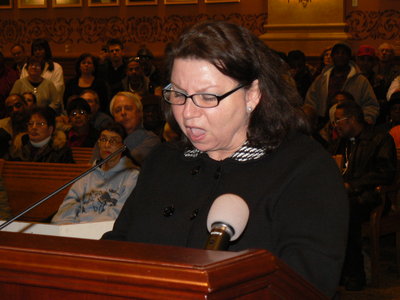The Jersey City Council faced three hours of criticism Wednesday night – some of it angry and some it seemingly sad – from about 350 residents who showed up for a hearing on the city’s proposed $507 million municipal budget.
Many of the speakers complained about the 25 percent tax increase in their bills starting this quarter. They also griped about items the city had spent money on and items they believed the city should cut in order to bring taxes down.
Residents complained about the city’s rehiring of two longtime employees after they retired with lucrative benefits payouts earlier this month (as reported in this newspaper last week), and they also criticized the council for introducing the budget so late into the current fiscal year. The current budget covers spending until this coming June 30.
“We are here and we are angry.” – Esther Wintner
________
Council rejects Fulop’s cost-cutting ideas
Some members of the public also voiced disapproval of the council’s rejection of certain cost-cutting measures proposed by Councilman Steven Fulop. The council instead approved what were seen as milder measures proposed by Mayor Jerramiah T. Healy.
Fulop tried to introduce three ordinances to save the city money, including a measure to cut health insurance to board members of the Municipal Utilities Authority and Incinerator Authority and to council members who have already have county health benefits through their regular jobs.
The council voted down Fulop’s ordinances by close votes, and instead voted to introduce ordinances by Healy requiring board members to pay for some of their health benefits.
Healy also made a 20 percent reduction in the 39 cars issued to city employees – in other words, reducing eight cars. The six City Council members who use city cars will get to keep them; three council members don’t use the cars.
Fulop and Viola Richardson voted against Healy’s ordinances because they believed they didn’t go far enough to reduce the budget deficit.
Fulop’s explanation of his ordinances and his castigation of his council colleagues set the mood for the evening.
“You come here tonight to engage in this stuff because you are getting your pockets picked every single week,” said Fulop, to roaring applause.
As for the budget itself, City Council President Peter Brennan said after the meeting that the budget will not be ready for passage until next month because there are more cuts to be made.
Putting words into action
West side resident Esther Wintner has attracted attention in recent weeks as an unofficial spokesperson for residents who are fed up with tax hikes, layoffs of low-level employees, and the city’s inability to cut the budget.
At the meeting, she received a loud ovation when she gave her name, then talked about the city’s reactive measures in dealing with the current budget situation.
“You try to pacify us and hoped we would fade away,” intoned Wintner angrily. “We are here and we are angry.”
Wintner’s fiery rhetoric focused not only on the budget. She announced that she is working with her neighbors to form a political action committee to run a candidate against appointed Councilman David Donnelly, her representative on the council, who faces a special election in November to continue filling the remaining term for the Ward B City Council seat. That seat had been occupied by Phil Kenny until he resigned in October after pleading guilty to taking $5,000 in bribes.
Some sad
And some speakers were mournful and even sad over the city’s attempts to balance the municipal budget by conducting furloughs of regular city employees and layoffs of seasonal and provisional workers.
Daniel Aguilar, a part-time soccer coach for the Jersey City Department of Recreation, was joined by several of the children he coaches in the city’s soccer program. He is one of the 279 employees who were laid off by the city officially on Friday as part of the city’s plan to cut spending. Aguilar spoke of the layoffs’ effect upon the kids participating in the program, leaving it with one coach for over 1,000 kids.
There were also plenty of suggestions from the public on how the city can curb waste without losing vital services and employees.
Andrew Velwest, a 22-year resident, offered the council a to-do list about how the city can save money, such as implementing energy saving elements to City Hall and laying off the city’s upper management, rather than target low-paid staff.
“We need to lay off the right people,” Velwest said. “We need to spread the pain.”
Ricardo Kaulessar can be reached at rkaulessar@hudsonreporter.com.
